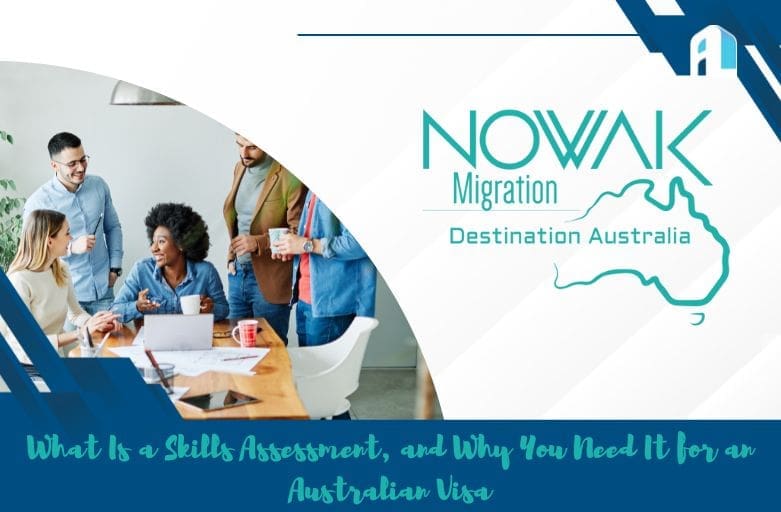What Is a Skills Assessment, and Why You Need It for an Australian Visa
Navigating the intricate process of obtaining an Australian visa requires a deep understanding of various requirements. Among these, a fundamental step is the acquisition of a skills assessment. This pivotal procedure is designed to validate your qualifications and work experience, ensuring they align with the standards set by the Australian government. In this comprehensive guide, we delve into the significance of skills assessments, explore the diverse types available, and shed light on why they are indispensable for a seamless Australian visa application.
Understanding Skills Assessment
Definition and Process: At its core, a skills assessment is a meticulous evaluation of your educational qualifications, work experience, and skills, conducted by designated assessing authorities in Australia. This assessment is tailored to match your expertise with the requirements of your nominated occupation in Australia. Understanding the nuances of this process is crucial, as it forms the foundation of your visa application.
Types of Skills Assessments: There are various types of skills assessments, each catering to specific visa categories. For instance, the General Skilled Migration (GSM) program, which includes Subclass 189, 190, and 491 visas, demands a skills assessment from applicants. Additionally, employer-sponsored visas like Subclass 482, 494 and 186 have their unique assessment criteria. Familiarizing yourself with the specific type required for your visa is vital for a successful application.
Role of Assessing Authorities: Assessing authorities play a pivotal role in the skills assessment process. These entities are responsible for evaluating your credentials and determining if they meet the Australian standards for your nominated occupation. Different occupations are assessed by different authorities, each having its own set of guidelines and requirements. Researching and selecting the appropriate assessing authority is the initial step toward a successful assessment.
Importance of Skills Assessment for Australian Visa
Validation of Qualifications: A positive skills assessment acts as a robust validation of your qualifications. It provides assurance to the Department of Home Affairs that your educational background aligns with the Australian standards for your chosen occupation. This validation is a crucial determinant in the visa approval process.
Enhanced Visa Approval Chances: Possessing a positive skills assessment substantially enhances your chances of visa approval. It signifies to the immigration authorities that you possess the necessary skills and expertise required for your nominated occupation. Applicants with a positive skills assessment often receive preferential treatment during the visa selection process.
Streamlining the Immigration Process: A skills assessment not only validates your qualifications but also streamlines the immigration process. It ensures that your application meets the specified criteria, reducing the likelihood of delays or complications. A meticulously prepared skills assessment can pave the way for a smoother visa application journey.
How to Obtain a Skills Assessment
Step-by-Step Guide: Obtaining a skills assessment involves a series of well-defined steps. These steps typically include gathering essential documents such as academic transcripts, employment certificates, and language proficiency test results. Following a detailed, step-by-step guide provided by the assessing authority is crucial to preparing a comprehensive application.
Required Documents and Qualifications: Different assessing authorities have specific document requirements. Ensuring you provide accurate and complete documentation is imperative. These documents often include proof of academic qualifications, evidence of work experience, and language proficiency test results, such as IELTS or PTE scores. Meeting the minimum qualification standards set by the Australian government is essential.
Common Challenges Faced: Applicants often encounter challenges during the skills assessment process, such as document verification issues or ambiguity regarding qualification standards. Addressing these challenges proactively is vital. Seeking assistance from professional migration consultants or engaging with online forums where applicants share their experiences can provide valuable insights into overcoming common hurdles.
Tips for a Successful Application: Preparing a successful skills assessment application requires meticulous attention to detail. Ensuring all documents are accurate, complete, and well-organized is paramount. Additionally, staying updated with the latest guidelines and requirements from the assessing authority is crucial. Seeking guidance from experienced migration agents can provide you with valuable tips and strategies to enhance your application’s chances of success.
Navigating Skills Assessment for Different Visa Types
Skilled Independent Visas (Subclass 189, 190, 491): For skilled independent visas, applicants must undergo a skills assessment to demonstrate their qualifications and work experience in a nominated occupation. The assessment ensures that applicants possess the skills needed to contribute meaningfully to the Australian workforce.
Employer-Sponsored Visas (Subclass 186, 494): Employer-sponsored visas, such as Subclass 494 and Subclass 186 Employer Nomination Scheme visa, require a skills assessment tailored to the specific occupation. These assessments are designed to validate both the applicant’s qualifications and their relevance to the nominated position offered by an Australian employer.
Other Visa Categories: Skills assessments are not limited to skilled and employer-sponsored visas. temporary work visas, may require a skills assessment, depending on the nature of the course or occupation. Understanding the specific requirements for each visa category is crucial for a successful application.
Differences in Assessment Criteria: Each visa category has its unique assessment criteria. For example, skilled independent visas focus on the applicant’s ability to work independently, while employer-sponsored visas emphasize the applicant’s suitability for the nominated position within an Australian organization. Understanding these differences ensures that your skills assessment aligns seamlessly with your chosen visa category.
Understanding Assessing Authorities in Australia
Overview of Assessing Authorities: Australia has several assessing authorities, each responsible for specific occupations. Engineers Australia, the Australian Computer Society, and the Australian Nursing and Midwifery Accreditation Council are just a few examples. Each authority has a detailed list of occupations it assesses, and applicants must select the appropriate authority based on their nominated occupation.
Specific Requirements and Guidelines: Each assessing authority has its unique set of requirements and guidelines. These can range from minimum years of work experience to specific qualifications and even English language proficiency levels. Understanding these requirements in detail and aligning your application with them is crucial for a successful assessment outcome.
Challenges and Solutions in Skills Assessment
Common Challenges Faced by Applicants: Applicants often face challenges such as delays in document verification, unclear guidelines, or discrepancies in qualification recognition. These challenges can be stressful but are not insurmountable with the right approach and guidance.
Solutions and Strategies: Addressing challenges effectively requires a proactive approach. Staying organized, double-checking all documentation, and seeking clarification from the assessing authority when in doubt are essential strategies. Engaging with online communities and forums where applicants share their experiences can provide valuable solutions to common challenges.
Case Studies: Real-life case studies of individuals who successfully navigated the skills assessment process can offer valuable insights. These case studies can highlight the challenges faced, the strategies employed, and the eventual outcomes. Learning from the experiences of others can provide applicants with a roadmap for their own skills assessment journey.
Impact of Skills Assessment on Visa Approval
Influence on Points-Based Immigration System: Australia operates on a points-based immigration system, where points are allocated based on various factors such as age, qualifications, work experience, and English language proficiency. A positive skills assessment significantly contributes to your points score, enhancing your eligibility for skilled migration visas.
Addressing Discrepancies and Concerns: In some cases, applicants may encounter discrepancies or concerns in their skills assessment report. Addressing these issues promptly and professionally is essential. This may involve providing additional documentation or clarification to the assessing authority. Ensuring that your skills assessment report is accurate and error-free is vital for a successful visa application.
Expert Advice and Resources
Importance of Professional Advice: Navigating the skills assessment process can be complex and daunting. Seeking professional advice from registered migration agents or consultants is highly recommended. These experts have in-depth knowledge of the assessment requirements, can guide you through the application process, and help you address any challenges that may arise.
Utilizing Online Resources: In addition to professional advice, applicants can benefit from utilizing online resources and official websites. These resources provide up-to-date information on assessment guidelines, required documentation, and frequently asked questions. Being well-informed and updated ensures that you are prepared for every stage of the skills assessment process.
Community Forums and FAQs: Engaging with online community forums and FAQs specific to your nominated occupation or assessing authority can provide a wealth of information. These platforms allow applicants to interact with others who have undergone similar assessments, share experiences, and seek advice. Learning from the collective knowledge of the community can be invaluable.
Conclusion
In conclusion, obtaining a skills assessment is a pivotal step toward realizing your dream of living and working in Australia. By understanding the intricacies of the assessment process, preparing a meticulous application, and seeking expert guidance when needed, you can significantly enhance your chances of a successful Australian visa application. Remember, each applicant’s journey is unique, and challenges, if they arise, can be overcome with determination, patience, and the right support. As you embark on this transformative journey, equip yourself with knowledge, stay proactive, and embrace the possibilities that await you in the land Down Under. Your Australian dream is within reach – make it a reality with a successful skills assessment and a well-prepared visa application.



